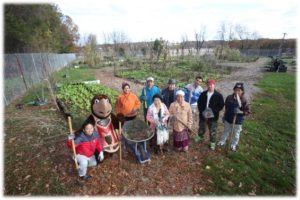As the Urban Agriculture Coordinator at University of Maryland Extension, Prince George’s County, I learned the importance of food every day. I love food. Food has become not only a comforter but also a bridge that I use to connect people and share stories. In my position, my main responsibilities included managing two community gardens and helping community residents identify urban agriculture opportunities. Our community gardens are nestled in the community of Riverdale, one of the most culturally rich unincorporated areas of Prince George’s County. The Sheridan Street Community Garden, formerly known as The Master Peace Community Garden, is roughly 8 years old, while the Field of Greens Community Garden is wrapping up its third season. Working in this position has been one of the most rewarding and fascinating experiences of my life.
 Every day, I watched as Bhutanese and Cameroonian refugees report to the garden at 8 AM or sometimes earlier to tend to their gardens, anticipating a yield to feed their families and beyond. My favorite stories of the garden are about a Bhutanese elder in his seventies named Jamuna. When I met Jamuna, she could not speak English very well. She would affectionately speak to me in Nepali like an aunt speaks to her niece, but I often struggled to understand or respond. I would smile in agreement, hoping the abundance of produce she always gave me was a display of appreciation and love. Her children would tell me stories about her transition to the United States; how she experienced multiple health issues and struggled to adjust to a new country far away from home. I believe the garden somehow rejuvenated her joy and continues to gives her strength.
Every day, I watched as Bhutanese and Cameroonian refugees report to the garden at 8 AM or sometimes earlier to tend to their gardens, anticipating a yield to feed their families and beyond. My favorite stories of the garden are about a Bhutanese elder in his seventies named Jamuna. When I met Jamuna, she could not speak English very well. She would affectionately speak to me in Nepali like an aunt speaks to her niece, but I often struggled to understand or respond. I would smile in agreement, hoping the abundance of produce she always gave me was a display of appreciation and love. Her children would tell me stories about her transition to the United States; how she experienced multiple health issues and struggled to adjust to a new country far away from home. I believe the garden somehow rejuvenated her joy and continues to gives her strength.
The Field of Greens Community Garden (FOG) is a fifty-three plot community garden also located in Riverdale. The garden is adjacent to William Wirt Middle School and a short walk from Parkview Gardens Apartment Complex, where the majority of our refugee gardeners reside. This space addresses public health and food access needs in a community identified as a “food desert.” In 2012, we were awarded a Community Impact Grant through the Redevelopment Authority of Prince George’s County, to transform an abandoned soccer field into a vibrant, inter-generational, multicultural, inclusive growing space for refugee families. FOG features a youth gardening area, shade structure, shed, food forest, and deer fence. The garden was created through numerous partnerships with the International Rescue Committee, Strong City Baltimore, Neighborhood Design Center, Lowe’s, Asplundh, University of Maryland, and many more. Community Gardens are a major part of urban agriculture. One major difference between community gardens and urban farms is that, urban farms are normally for commercial production while community gardens are hobby or small scale take home operations.
Urban Agriculture benefits include:
- Build community comraderey and empower underserved communities
- Revenue generation and local economy booster
- Reestablish pollinator habitats and increase biodiversity inside cities
- Increase physical activity and improve diet
- Increase access to affordable fresh local food
Urban Agriculture is fluid; always changing in its approach and concepts, which is one reason I was so drawn to this career path. In my career, I have also had the opportunity to serve on the Prince George’s County Food Equity Council (FEC). The FEC is a collective of twenty-two leaders across the food system who advocate for a better food system through developing policies that support public health, promote economic opportunity, and create a better life for residents of the county. Organizations like the FEC truly tie all the work together to create just food systems for all. Urban Agriculture is attracting many different groups of people including veterans, millennials, special needs populations, seniors, and returning citizens. Food is a universal language that captures all people and all stories. This is just one example of how urban agriculture uplifts people and keeps communities thriving.
Michelle Nelson, currently works as the Community Garden Program Manager with Maryland National Capital Park and Planning Commission. If you have any questions about community gardens or urban agriculture, please feel free to contact her at mchllnlsn@gmail.com

